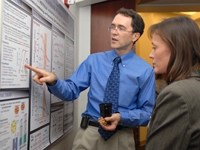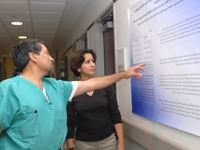There is a new movie currently playing in theaters in which a man undergoing heart surgery finds himself in a state of "anesthetic awareness." He is awake and can feel the scalpel cutting into his chest, but he is completely paralyzed and unable to alert the doctors to his condition.

Dr. Hugh Hemmings, vice chairman of anesthesiology research, discusses one of his research posters.
Being awake during surgery is one of those classic patient fears that tend to haunt some backburner of the mind even though the likelihood of it is so remote that it makes perfect fodder for a Hollywood thriller.
Still, if any of those lingering fears could possibly persist, the Anesthesiology Research Exposition, held Nov. 27 in Weill Cornell Medical College's Department of Anesthesiology, served as an opportunity to put them to rest for good.
Thirty-two different researchers presented posters that represented the entire spectrum of the science, including projects on obstetrics anesthesia, cardiac anesthesia and general anesthesia. Many of the authors were on hand to explain and defend their findings to their colleagues.
"This is really an opportunity for people in the department to dialogue," said Rachel Brody, R.N., clinical research administrator in the Department of Anesthesiology.

Dr. Vinod Malhotra (left) explains his study of anesthetic challenges to robot-assisted radical prostatectomy to Dr. Panchali Dhar.
Anesthesiology research, like almost every other brand of scientific tinkering, can be a lonely pursuit. Many investigators work in teams, but the nature of their research pulls them into their data and away from their colleagues. Events like this research exposition offers the chance to call everyone back home from their investigative islands and show off what they've discovered since they've been away.
"Because the progress of our research is so vast and varied from year to year, it's not easy for everyone to know everything that is going on," said Dr. Hugh Hemmings Jr., vice chair of research in the Department of Anesthesiology. "It's refreshing for people to see what is going on in their own department."
Another function of the expo is to expose medical students who are still deciding their career paths to the department. Residents can also find prospective research partners there.
"Students possibly interested in anesthesiology can come here and see our department and be exposed to the larger medical community of Cornell," Dr. Hemmings said.
Photography by Weill Cornell Art & Photography.

